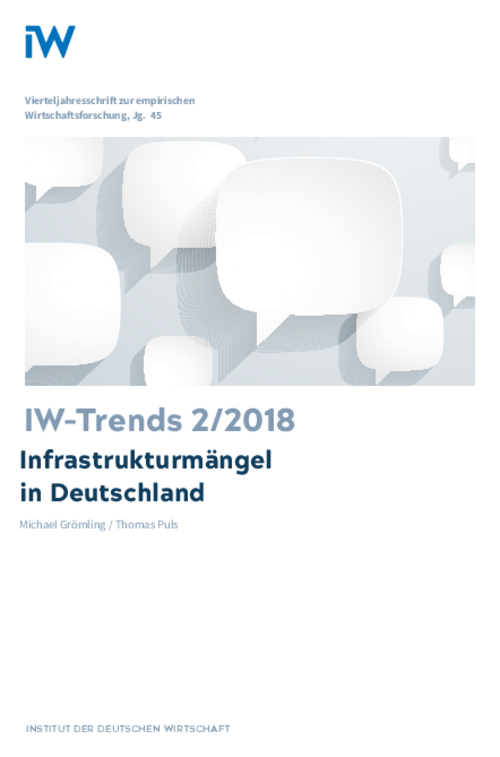German companies’ business operations are increasingly being hampered by infrastructure deficiencies. Following up on their initial 2013 study, the German Economic Institute (IW) used their regular survey on the business cycle to examine how the condition of central infrastructure networks affects companies.

Exposure Levels by Industry and Region Based on a Company Survey: Infrastructure Deficiencies in Germany
IW-Trends

German companies’ business operations are increasingly being hampered by infrastructure deficiencies. Following up on their initial 2013 study, the German Economic Institute (IW) used their regular survey on the business cycle to examine how the condition of central infrastructure networks affects companies.
Conducted in the spring of 2018, the survey shows that the situation has worsened significantly in the last four years. A good 68 per cent of the companies surveyed are regularly affected in their business activities by infrastructure deficiencies. This is 10 percentage points more than in autumn 2013. The proportion of significantly affected companies has risen particularly sharply, to 16 per cent. The most serious problems are caused by the road and communication networks. There are also regional differences in the level of the burden. The road traffic situation is particularly critical in the state of North Rhine-Westphalia, while communication networks are causing problems in eastern Germany. In the case of the road networks, the problems mentioned in the survey have clearly been building up for many years as a result of underfunding. The issue is now being addressed and the government is making more money available for capital expenditure. However, this is itself one reason for the region’s current lower rating, as more road works initially mean more traffic jams and operational problems. It is becoming clear that the present problem is not so much a lack of money as a lack of qualified engineers at the relevant authorities. Here, too, the government is trying to ameliorate the situation, but there is a severe shortage of civil engineers on the job market. If these problems are to be solved in the medium term, the priority must be to make the civil service considerably more attractive for civil engineers.

Michael Grömling / Thomas Puls: Infrastrukturmängel in Deutschland – Belastungsgrade nach Branchen und Regionen auf Basis einer Unternehmensbefragung
IW-Trends

More on the topic

Compendium 5.4: CO2 Regulation of Road Transport in Europe
With the Compendium CO2 Regulation in Europe, the IW has been providing the interested public with a comprehensive collection of data on the development of CO2 emissions from passenger car traffic in the European Union, as well as on the applicable regulatory ...
IW
The Transformation of the Automotive Industry: An International Comparison of Germany's Innovation Performance
The automotive industry is undergoing a comprehensive technological transformation that is challenging established value chains. Making sure that domestic research helps to shape this ongoing transformation is therefore an important task for countries with a ...
IW